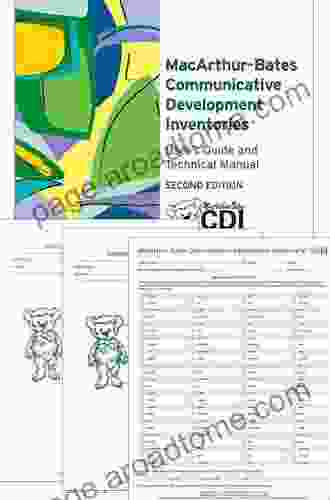Unlocking Communication: An Adaption of the Macarthur Bates Communicative Development Inventory for Language Learners and Non-Native Speakers

The Macarthur Bates Communicative Development Inventory (MCDI) has long been a cornerstone in the field of language development, providing researchers and clinicians with a standardized and reliable tool to assess the expressive and receptive language skills of young children. However, its application to language learners and non-native speakers has been limited, as the original MCDI was not specifically designed to capture the unique linguistic features and developmental trajectories of these populations.
5 out of 5
| Language | : | English |
| File size | : | 8282 KB |
| Text-to-Speech | : | Enabled |
| Screen Reader | : | Supported |
| Enhanced typesetting | : | Enabled |
| Word Wise | : | Enabled |
| Print length | : | 142 pages |
To address this gap, a pioneering adaptation of the MCDI has been developed, meticulously tailored to meet the needs of language learners and non-native speakers of English. This groundbreaking adaptation offers a comprehensive assessment of their communicative abilities, enabling educators, speech-language pathologists, and language professionals to gain a deeper understanding of their clients' strengths and areas for improvement.
Innovative Features and Benefits
The adaptation of the MCDI for language learners and non-native speakers incorporates several innovative features that set it apart from the original version and enhance its effectiveness in this specific population. These features include:
- Expanded vocabulary and grammatical structures: The adapted MCDI includes an extended vocabulary and a broader range of grammatical structures to capture the diverse language use patterns of language learners and non-native speakers.
- Focus on conversational skills: The adapted MCDI places a strong emphasis on conversational skills, assessing the ability to engage in meaningful and natural conversations in English.
- Cultural sensitivity: The adapted MCDI is culturally sensitive, acknowledging the impact of cultural and linguistic backgrounds on language development and communication patterns.
- Normative data for language learners and non-native speakers: The adapted MCDI provides normative data specifically for language learners and non-native speakers, allowing for accurate interpretation of results and tracking of progress over time.
Empowering Professionals
The adaptation of the MCDI for language learners and non-native speakers empowers educators, speech-language pathologists, and language professionals in several ways:
- Comprehensive assessment: The adapted MCDI provides a thorough assessment of expressive and receptive language skills, including vocabulary, grammar, conversation, and pragmatics.
- Identification of strengths and weaknesses: The adapted MCDI helps professionals identify areas of strength and weakness in a client's language development, enabling them to tailor interventions and instruction accordingly.
- Tracking progress: The adapted MCDI allows professionals to track a client's progress over time, monitoring their improvement and adjusting interventions as needed.
- Collaboration with parents and caregivers: The adapted MCDI provides valuable information for collaboration with parents and caregivers, involving them in the assessment and intervention process.
Applications in Language Learning and Intervention
The adaptation of the MCDI for language learners and non-native speakers has a wide range of applications in language learning and intervention, including:
- Assessment of English language proficiency: The adapted MCDI can be used to assess the English language proficiency of language learners and non-native speakers, identifying areas where additional support is needed.
- Planning and implementation of targeted interventions: The adapted MCDI provides a basis for planning and implementing targeted interventions that address specific language skills and areas of difficulty.
- Monitoring progress and evaluating outcomes: The adapted MCDI can be used to monitor progress and evaluate the outcomes of language learning interventions, ensuring that they are effective and making adjustments as necessary.
- Research on language acquisition and development: The adapted MCDI can be a valuable tool for researchers studying language acquisition and development in language learners and non-native speakers.
The adaptation of the Macarthur Bates Communicative Development Inventory for language learners and non-native speakers is a groundbreaking assessment tool that empowers educators, speech-language pathologists, and language professionals to unlock the communicative potential of their clients. With its expanded features, cultural sensitivity, and normative data, the adapted MCDI provides a comprehensive and accurate assessment of language development, enabling professionals to tailor interventions and instruction, track progress, and collaborate with parents and caregivers. This innovative tool is a valuable addition to the field of language learning and intervention, promoting effective communication and empowering language learners and non-native speakers to reach their full potential.
5 out of 5
| Language | : | English |
| File size | : | 8282 KB |
| Text-to-Speech | : | Enabled |
| Screen Reader | : | Supported |
| Enhanced typesetting | : | Enabled |
| Word Wise | : | Enabled |
| Print length | : | 142 pages |
Do you want to contribute by writing guest posts on this blog?
Please contact us and send us a resume of previous articles that you have written.
 Book
Book Novel
Novel Page
Page Chapter
Chapter Text
Text Story
Story Genre
Genre Reader
Reader Library
Library Paperback
Paperback E-book
E-book Magazine
Magazine Newspaper
Newspaper Paragraph
Paragraph Sentence
Sentence Bookmark
Bookmark Shelf
Shelf Glossary
Glossary Bibliography
Bibliography Foreword
Foreword Preface
Preface Synopsis
Synopsis Annotation
Annotation Footnote
Footnote Manuscript
Manuscript Scroll
Scroll Codex
Codex Tome
Tome Bestseller
Bestseller Classics
Classics Library card
Library card Narrative
Narrative Biography
Biography Autobiography
Autobiography Memoir
Memoir Reference
Reference Encyclopedia
Encyclopedia Simply Pictures
Simply Pictures Shirley Riley
Shirley Riley Vladimir Leskovac
Vladimir Leskovac Stella Gibbons
Stella Gibbons Noel B Gerson
Noel B Gerson Sham Bhangal
Sham Bhangal Scott Irvine
Scott Irvine Paul Brown
Paul Brown Pravin Banker
Pravin Banker Peter Loshin
Peter Loshin Paul Molitor
Paul Molitor Norman Vincent Peale
Norman Vincent Peale Peter C Brinckerhoff
Peter C Brinckerhoff Owen Hatherley
Owen Hatherley Warren Littlefield
Warren Littlefield Thomas Nelson
Thomas Nelson Steve Ettlinger
Steve Ettlinger Shanddaramon
Shanddaramon Swami Tadatmananda
Swami Tadatmananda Sheridan Morley
Sheridan Morley
Light bulbAdvertise smarter! Our strategic ad space ensures maximum exposure. Reserve your spot today!

 Gabriel Garcia MarquezMaster Internet Server Configuration with the Ultimate Guide: Practical...
Gabriel Garcia MarquezMaster Internet Server Configuration with the Ultimate Guide: Practical... George Bernard ShawFollow ·19.8k
George Bernard ShawFollow ·19.8k Felipe BlairFollow ·4.7k
Felipe BlairFollow ·4.7k Glenn HayesFollow ·19.8k
Glenn HayesFollow ·19.8k Darnell MitchellFollow ·11.8k
Darnell MitchellFollow ·11.8k Paulo CoelhoFollow ·17.5k
Paulo CoelhoFollow ·17.5k Dillon HayesFollow ·6.6k
Dillon HayesFollow ·6.6k Jared PowellFollow ·14.6k
Jared PowellFollow ·14.6k Clay PowellFollow ·5.9k
Clay PowellFollow ·5.9k

 W. Somerset Maugham
W. Somerset MaughamNourishing Delights: Easy Recipes Without Salt, Oil, or...
Are you looking for...

 Zachary Cox
Zachary CoxThe Art of Kitchen Fitting: A Masterful Guide to Culinary...
The kitchen, the heart of...

 Elliott Carter
Elliott CarterArticulating the Spirit of Black Women Teacher Leaders:...
In the tapestry of education,...

 James Gray
James GrayThe Complete Guide to Arduino: Your Journey to...
: Unveiling the...
5 out of 5
| Language | : | English |
| File size | : | 8282 KB |
| Text-to-Speech | : | Enabled |
| Screen Reader | : | Supported |
| Enhanced typesetting | : | Enabled |
| Word Wise | : | Enabled |
| Print length | : | 142 pages |














